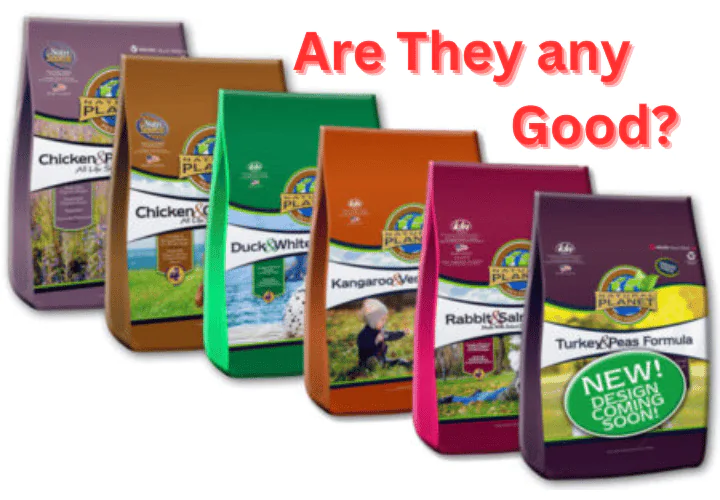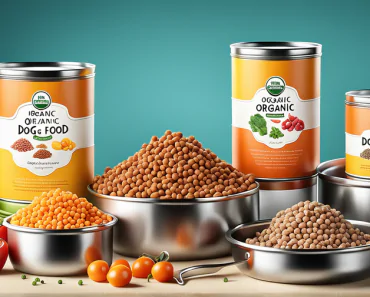Table of Contents
As a doting pet parent, you spare no expense when it comes to providing the absolute best for your furry companion. You splurge on fancy toys, the softest orthopedic bed, regular appointments at the doggy spa for oatmeal baths and nail trims, and anything else that will make your pup happy and healthy. But when it comes to choosing the healthiest food to fuel your dog’s daily activities, is paying more for organic dog food really worth the higher price tag?
This exhaustive 2000+ word guide will walk you through all the key factors to consider when deciding if upgrading to organic dog food is the right call for your budget and furry family member. We’ll discuss why organic pet food costs more, potential health and environmental benefits, cost-saving tips, and common questions to determine if the premium price is justified. Keep reading to learn if organic dog food’s benefits warrant the higher costs and how you can provide quality nutrition without breaking the bank.
Demystifying Organic Dog Food
The term “organic” gets thrown around a lot these days when it comes to both human and pet food. But what exactly does it mean for dog food to be certified organic? And how does organic dog food differ from conventional dog food alternatives lining pet store shelves? Let’s break it down.
Defining Certified Organic Dog Food

For dog food to bear the official USDA Organic seal, it must contain 95% or more organic ingredients and be produced without the use of genetic engineering, synthetic pesticides, chemical fertilizers, antibiotics, growth hormones, artificial preservatives, artificial colors, or artificial flavors. This rigorous standard ensures ingredients are grown and processed sustainably without toxic chemicals that could harm your pet’s health or the environment.
As we outlined in more detail in our Ultimate Guide to Organic Dog Food, the “made with organic” label on pet food requires only 70% of ingredients to be organic, but still avoids GMOs and harsh chemicals in production. Organic certification verifies that ingredients are grown and processed sustainably without toxic chemicals through third party audits.
Some key characteristics that set apart certified organic dog food formulas include:
- Free of synthetic pesticides, hormones, antibiotics, and GMOs
- Higher amounts of meat-based proteins vs fillers like corn, wheat, soy
- Whole food complex carbohydrate sources like brown rice, quinoa, and oats
- Potentially higher antioxidant and omega fatty acid levels
- Only natural preservatives like vitamin E instead of chemical additives
- Eco-friendly BPA-free packaging and recycling programs
Organic certification involves traceability of ingredients from farm to finished product, prohibiting co-mingling with conventional supplies throughout the supply chain. This helps alleviate concerns over food purity and safety for discerning pet parents.
Why Does Organic Pet Food Cost More to Produce?
Growing and manufacturing high quality dog food with certified organic ingredients requires significantly more time, labor, and resources compared to conventional pet food production methods. Here are some of the main reasons behind the increased costs:
1. Lower crop yields: Organic crops are grown without the use of synthetic pesticides or chemical fertilizers. Since pests and weeds must be managed through physical removal, natural substances, and diligent crop rotation instead of chemicals, yields per acre are typically 20-50% lower for organic compared to conventional farming.
2. Organic feed requirements for livestock: In order for meat, dairy, and eggs to be certified organic, the animals must be fed 100% certified organic feed to avoid contamination. But sourcing enough organic corn, soybeans, grains, and hay can be challenging due to more limited supply and higher market prices.
3. Strict separation during manufacturing: Great care and oversight must be taken during manufacturing to prevent co-mingling of organic and non-organic ingredients through batch production schedules, sanitation procedures, and strict quality control auditing. Natural preservatives also cost more than artificial ones.
4. Rigorous certification process: From multiple on-site farm inspections yearly, to supplier audits, to final product testing and review, maintaining organic certification involves considerable time, staffing, and paperwork to prove integrity across every step of the supply chain. This administrative burden increases costs.
5. Lack of scale and sourcing challenges: Overall organic grain and meat production remains far lower than conventional agriculture. As consumer demand grows, bigger economies of scale in organic farming and centralized manufacturing locations will help lower costs. But sourcing a diversity of organic ingredients from smaller regional farms can result in higher mark-ups currently.
6. Positioning organic as premium: As more shoppers seek out premium “clean label” foods with simple, recognizable ingredients, some brands market their organic certification prominently and price products higher to convey social values, trusted sourcing, and product quality – adding to costs.
When you add up the extended timelines, reduced yields, extra steps required, and costs of verifying adherence to the National Organic Program standards, making quality food with organic ingredients requires significantly more resources all the way from farm to bowl. But are the purported benefits worth the higher price point?

Potential Benefits of Feeding Your Dog Organic Food
While some skeptics argue the nutritional differences between premium organic and high-end conventional dog foods are minor or negligible, several scientific studies have indicated some potential health and environmental advantages:
1. Higher antioxidant levels
Multiple studies have found organic fruits, vegetables, grains and meat contain around 20-40% higher levels of certain antioxidants like vitamin C and lycopene compared to conventionally harvested crops. Pesticide application appears to reduce the plant’s own antioxidant production. These antioxidants are important for immune system health and preventing oxidative damage to cells.
2. Lower pesticide residues
Detectable pesticide residues are anywhere from 4x to 7x more likely to be found in conventional vs. organic pet food ingredients, as we analyzed in depth in Is Organic Dog Food Really Pesticide Free?. While amounts are generally low, some vets argue there may be effects from chronic, long-term exposure. Studies are limited but ongoing.
3. Potential digestion and allergy benefits
The lack of synthetic additives, thickeners, artificial preservatives and GMO ingredients in certified organic foods may be easier for some dogs to digest and less likely to cause irritations or allergies. More natural omega-3s and digestive enzymes in organic foods also support better absorption and gut health.
4. Environmental sustainability
Organic agricultural production promotes biodiversity, enriches soil health, reduces toxic chemical pollution into waterways, and uses around 45% less energy overall than conventional farming methods. This benefits pets, people and the planet.
While not every dog may benefit substantially from a totally organic diet, for pets with food sensitivities, allergies, digestion issues, or other health conditions, the extra attention to high quality ingredients and purity in organic pet food manufacturing can be advantageous. Always discuss dietary changes with your veterinarian, especially for dogs on therapeutic foods.
Cost vs Benefit Analysis of Feeding Organic Dog Food
Given the array of benefits discussed so far, you may be ready to switch your dog to premium organic food brands today. But hold on – it’s not quite that simple for every pet. There are a few other factors to weigh before deciding if paying more for organic dog food is the right call for your budget and fur baby.
Assess your dog’s health needs: For otherwise healthy adult dogs without major food sensitivities or allergies, a high quality conventional diet made with premium ingredients may supply solid nutrition without breaking the bank. However, pets with digestion issues, frequent ear infections, skin irritations, or other health conditions potentially exacerbated by synthetics, hormones or additives might warrant upgrading to an organic diet after consulting your vet.
Take a close look at current ingredient quality: If your dog is currently eating a brand you trust, with high quality identifiable ingredients like chicken, brown rice, and veggies, with minimal additives or fillers that could trigger sensitivities – the benefits of switching to organic may be negligible. But if your current food contains many vague ingredients like “animal digest” plus lots of preservatives, an organic upgrade could reduce exposure to synthetics.
Crunch the cost differential: This is the big one. You’ll typically pay around $20 or more extra per month to feed premium organic kibble over high-end conventional brands. The price gap for canned and freeze-dried organic formulas can be $3 or more per day. Carefully weigh if your budget can absorb the uptick in cost before switching entirely to organic.
Evaluate duration of feeding: Rotating between high quality conventional and certified organic diets, or feeding organic only during key life stages like puppyhood and senior years, can allow you to take advantage of the benefits during pivotal developmental periods while enabling more significant long term cost savings.
Do your homework reading labels closely, consulting with your veterinarian, and evaluating your budget and priorities realistically. Often upgrading just the protein sources or treats to organic options while keeping conventional kibble can provide a compromise.

Actionable Tips to Save Money on Organic Dog Food
If your head tells you standard dog food is more affordable but your heart says organic is healthier, try these actionable tips to enjoy some benefits of organic without breaking the bank:
Focus on certain key organic proteins: Sourcing certified organic free-range chicken, grass-fed beef, cage-free eggs, wild caught salmon, or other proteins to mix into or top conventional kibble can boost overall nutrition without needing to buy costly fully organic meals. As we outlined in Benefits of Providing Organ Meat for Dogs, adding tasty protein toppers is a wins for both you and your furry friend.
Explore DIY organic homemade options: Preparing your own dog food at home with bulk USDA certified organic grains like oats, certified organic meats, vegetables, oils, supplements etc can potentially save money compared to pre-made commercial organic options when following vet recommended recipes. Just be sure to consult your veterinarian to ensure proper dietary balance. Check out The Ultimate Guide to Feeding Organ Meat for Dogs for more details.
Take advantage of online discounts and sales: Ordering organic brands you trust through online pet retailers like Chewy or Amazon on recurring auto-ship schedules can save 5-10% off list prices. Sign up for email/text alerts from brands and stores to get notifications of sitewide or product-specific sales, and timing purchases right on deals.
Shop around for lowest pricing: Not all retailers charge exactly the same prices on organic dog foods, especially smaller local pet shops who may run frequent sales. Buying directly from niche organic brands’ websites also typically saves around 15% off suggested retail pricing.
While going 100% certified organic remains cost prohibitive for many dog owners, simply incorporating some organic ingredients into your pup’s diet or grooming routine can make a difference in reducing synthetic exposure without fully breaking the bank. Every little upgrade helps!
The Verdict: Is the Cost of Organic Dog Food Worth It For Your Pet?
So what’s the final verdict – is paying the premium for organic dog food worth it when considering the potential pros vs cons? Here is a quick recap to help you decide what makes sense for your faithful companion:
Pros of Organic Dog Food:
- Avoidance of pesticides, hormones, antibiotics and GMOs
- Potentially higher antioxidant levels
- Focus on whole food ingredients
- Possible digestion and allergy benefits
- Reduced chemical exposure risk long-term
- Promotes eco-friendly agriculture and sustainability
- Provides peace of mind for many pet parents
Cons of Organic Dog Food:
- Significant price premium over conventional diets
- Lack of regulation and standardization in the pet food industry
- Limited evidence of drastic health improvements
- Not widely available for all brands and formulas
- Still not affordable for all budgets
- Difficult for average consumers to assess quality and value
As you can see, deciding comes down to your priorities, budget, and assessing your individual dog’s needs. There is no universally right or wrong answer. While certified organic brands come with a higher cost, many pet parents feel the extra peace of mind and fulfillment of providing quality nutrition is worth it. Get all the facts to make the optimal decision for your fur baby!

Frequently Asked Questions About Organic Dog Food
Now that we’ve covered the key considerations in choosing organic dog food, let’s tackle some common questions:
Q: What types of health problems can pesticides and chemicals in conventional dog food potentially cause?
While amounts of chemical residues found in most conventional dog foods are quite low, some studies have detected concerning levels of certain persistent pesticides like glyphosate. Chronic long-term exposure could hypothetically impact endocrine, immune system, and neurological health over a pet’s lifetime according to some preliminary veterinary research. However, the extent of health risks has not yet been clinically proven through controlled studies and remains controversial. Talk with your vet about any concerns.
Q: Are there any 100% certified organic dog food brands available?
Currently only a very small number of niche pet food brands offer 100% USDA certified organic formulas, though it is possible to achieve. Small batch, locally sourced, and dehydrated dog food blends tend to have the highest organic content versus mass-market kibbles. When shopping, look for comprehensive third party supply chain certification beyond just a “made with organic” label claim.
Q: Is organic dog food actually more nutritious than high quality conventional dog food?
Several scientific studies have found organic kibble and canned formulas contain around 20-40% higher levels of certain vitamins, antioxidants like vitamin E, and omega-3 fatty acids compared to conventional foods. However, even premium conventional dog foods are formulated to meet AAFCO nutritional requirements today. Consider your individual dog’s health needs when assessing potential nutritional upgrades from organic.
Q: Can you make truly organic homemade dog food using organic ingredients?
Yes! Choosing USDA certified organic grains, meats, vegetables, oils, supplements and superfoods at home enables you to control and custom-tailor everything that goes into your dog’s diet. Be sure to consult with your veterinarian to develop balanced homemade recipes that meet your pet’s nutritional needs. Look for discounted bulk organic ingredients online or at local farm supply stores.
Q: Should I focus on making some homemade foods organic more than others?
It can make sense to be selective. Prioritize organic certification for any animal protein ingredients like chicken, beef, pork, fish that cannot be peeled or washed to remove pesticides. Also choose organic for fruits and veggies with thin or porous skins like berries vs avocados or bananas. Making your own treats with organic oats, sweet potatoes, bananas, peanut butter etc gives you control over snacking.
Q: What are the most important organic certifications to look for in dog food?
Legitimate organic certification programs to check labels for include:
- USDA Organic Seal – Ensures 95-100% organic content under US standards
- Certified Organic by QAI – Compliance with the National Organic Program
- Non-GMO Project Verified – 3rd party audited to be completely GMO-free
- Demeter Biodynamic – The most stringent organic certification that exceeds USDA requirements
Focus on comprehensive organic production and handling certifications rather than just marketing lingo when evaluating claims. Independent validation from organizations like the above gives credibility versus unregulated label terms.
Hopefully this guide has provided clarity on what organic certification entails, how exactly organic dog food differs from conventional, the potential pros and cons of upgrading your dog’s diet, cost-saving strategies, and answers key questions to consider. While going 100% organic remains pricier, many pet parents find the extra peace of mind worthwhile. Get the facts to make the optimal decision for your pooch!






